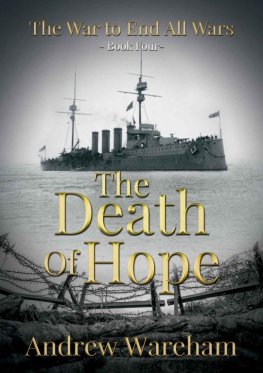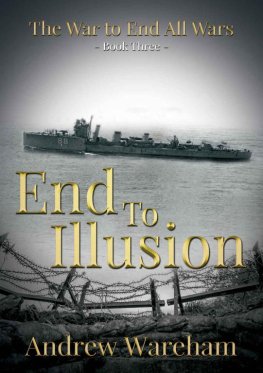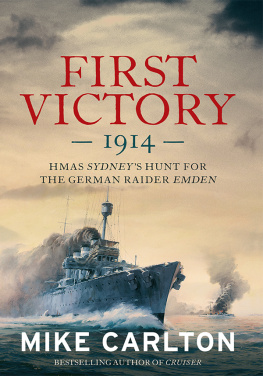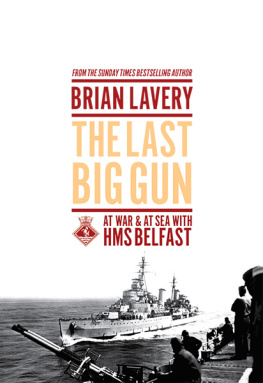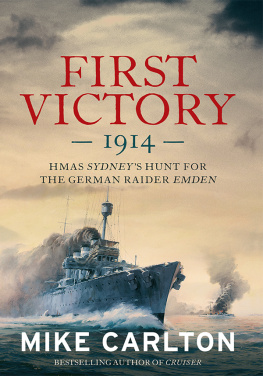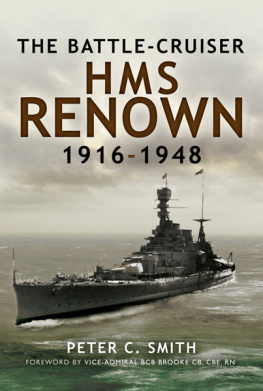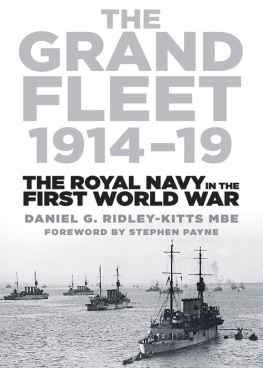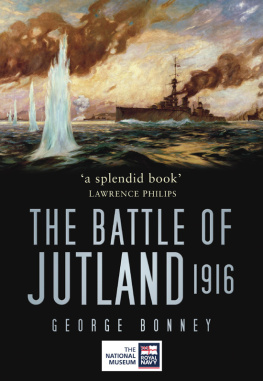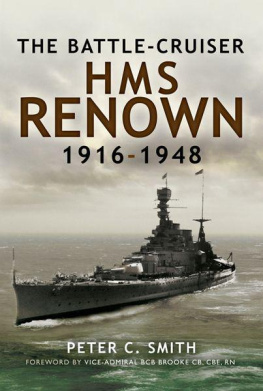Andrew Wareham
FALLING INTO BATTLE
Stand down from entering harbour. Assume Harbour Duties. Midshipmen Adams, Baker, McDuff and Sturton to Captains cabin, six bells, forenoon.
It was October of 1913, the weather surprisingly clement for Portsmouth in autumn, the sun shining on HMS Victory and the scores of naval vessels clustered about the great harbour.
The voice bellowed from the bridge of St Vincent and the crew responded with the quiet efficiency of a long commission, now coming to its end as the dreadnought tied up in Portsmouth harbour prior to entering the yard for a major overhaul. The bulk of the officers and ratings would be posted away, a very few remaining with the ship while she was in dockyard hands for the better part of a year.
The four senior midshipmen knew they must be called to the cabin at this juncture in their careers. They had been aboard for two years, had crossed the Atlantic twice and sailed to South Africa and back by way of Gibraltar and six months in the Med. In that time they had served in navigation and gunnery departments and discovered much of the reality of naval life finding some to be as they had hoped during the years in Dartmouth, a little to be surprising, and the bulk of routine rather more tedious than juvenile imaginations had expected. They had completed the minimum of seatime demanded of the trainee and now must discover whether they had made the grade, had passed their final test. The ship was paying off, in the old-fashioned term, and they must be told what was to become of them.
Simon Sturton thought he had done quite well in his two years at sea. The Gunnery Officer had shown him some favouritism, discovering a gunnery specialist in him, and he hoped he might be sent to another battleship where he could build a career around the big guns. He had been beaten only once in the two years, and that for coming back aboard drunk from an evening ashore a trivial offence and his dozen earned and forgotten. Others in the Gunroom the midshipmens mess had been thrashed on an almost weekly basis, and generally well-deserved, too! A beating on the bare backside with the scabbard of a midshipmans dirk hurt but, far more importantly, was a humiliation, a man being treated as the merest of boys.
There was no tolerance in the Navy for the weaklings and the incompetents who would not learn to keep themselves and their uniforms clean; who were late on watch; or who failed to master the basics demanded by the Navy. They had been beaten for every infraction of the simple rules of seamanship, encouraging them either to conform or to get out.
Simon reflected on the word seamanship; that was the important part, the mid coming aboard as a boy and leaving as a man. The two years had made him a true man and had shown, he suspected, that poor Baker had no manliness in him.
He lined up behind Adams and McDuff two minutes before six bells, heard running feet as Baker tried to avoid being late yet again. The boy was idle and an idiot almost literally so in Simons opinion; he seemed to look for trouble. He could not imagine how Baker had ever passed the entry examination to Dartmouth and knew that he had no more than scraped through the termly tests that followed. Add to that, he was overweight, stuffing himself with unhealthy cakes and chocolate, spending almost all of his over-large allowance from home on sweeties.
Simon did not like Baker. He was not alone in that. The boy did not fit in, was not one of them, came from the wrong background and did not know how to behave; he was not the son of a gentleman, or of a family pretending to that status. Baker had been cold-shouldered at Dartmouth and effectively ostracised aboard ship, left on his own to survive as he could, to discover the rules or break them unwittingly. He arrived panting and pushed himself into second place in the line, chewing frantically to empty his mouth before he was ordered into the cabin.
It was a hard service, Simon reflected, wondering belatedly if they might not have tried to help Baker make a man of himself. Too late now!
A Paymaster Lieutenant who acted as the captains secretary opened the door and called the four in. Together, there was to be no privacy. They stood in their row and stiffened to the salute, as was proper.
Captain Ironside, bareheaded, nodded his thanks.
Easy. I have your postings here. I sent your reports in from Gibraltar and the Admiraltys response was waiting for us as is normal. You have two years service in aboard my ship and have turned yourselves from useless little boys into men. In some cases, useful men.
Simon winced; it was likely that part of the next few minutes could turn out very unpleasant to listen to.
Mr Adams, you will go to Iron Duke as sublieutenant. She is a flagship, as you know, under Admiral Jellicoe and still fitting out, the latest and largest of superdreadnoughts. It is a posting that will place you under the eye of the most senior members of the Fleet and which will give you the opportunity to shine. I believe that you will be capable of grasping that nettle. You go with my good wishes.
He had also received an outstanding personal report, Simon knew. Well-deserved. Adams was an able man - though no better than he was. Adams was the younger son of a viscount who was active in the City and was known to government; he was also related by marriage to the Barings, one of the greatest banking families necessary qualifications for officers in a flagship. Simon could not hope for such a posting.
Mr Baker. You will report to the Admiralty as a midshipman. What will become of you, I do not know. I presume you will be posted somewhere, unless you send in your papers. I have written to your father recommending that he withdraw you from the Royal Navy. I do not believe that you have it in you to become a successful naval officer. Your record aboard this ship has been barely adequate, Mr Baker, not quite poor enough to justify your dismissal. You have shown no interest in the sea and I would advise you to take up farming.
Baker said nothing, as was only correct; the unhealthy redness drained from his face as he faced the prospect of failure. Still a minor, nineteen years of age and dumped on the scrapheap.
Mr McDuff, you are posted to Good Hope, armoured cruiser, as sublieutenant. She is an old ship but powerful still. I believe she is for the South Atlantic on a long cruise. Probably based out of Cape Town. You have the opportunity to make a start to a very respectable career, young man.
McDuff had hoped for better, a modern ship under the eyes of the fleet, Simon knew, but at least he had a cruiser where there were chances to specialise.
Mr Sturton, you have had two good years on St Vincent and have the chance to build upon that start. You will go as sublieutenant to Sheldrake, destroyer, at Chatham. She is expected to join the Mediterranean Fleet. You will have the benefits of a small ship, Mr Sturton. Work hard and you may look for early promotion which I do not doubt you deserve. You are to contact your trustees in London before joining Sheldrake in eight days from now.
A destroyer! Newish, and oil-fired, which was in her favour and armed with a pair of four inch, breech-loaders not quick firers if he remembered correctly, as well as two twelve pounders. Against that, short cruises, never more than a few days at sea for needing to refuel - and hard-lying. Destroyers were wet and cold and uncomfortable with poor messing at sea. No chance of becoming a specialist gunnery man an officer on a destroyer must turn his hand to everything. On the positive side if he managed a good personal report from his new captain, he could make lieutenant in two years and be first of an old boat a year later. There was every chance he could be made lieutenant-in-command in five years.


